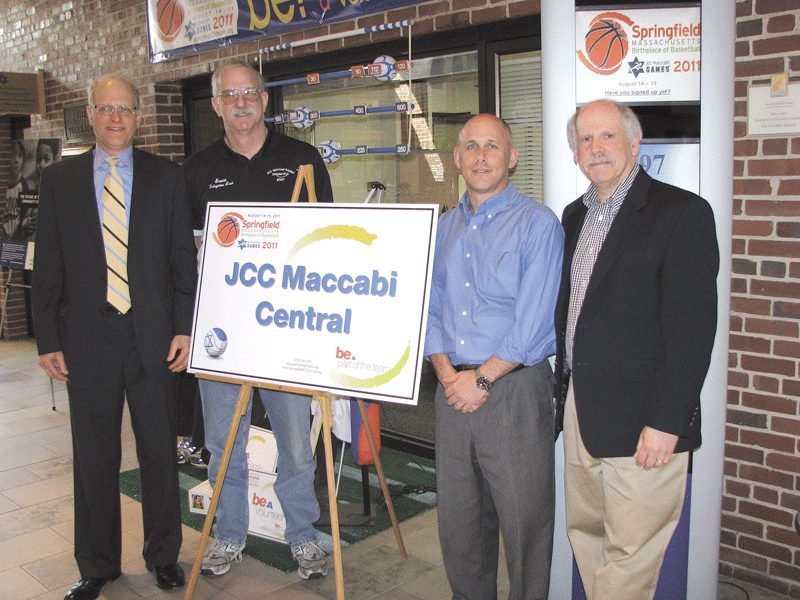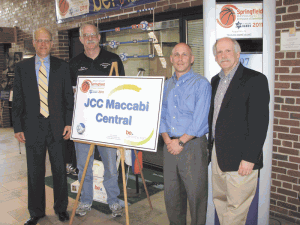
Showcasing Athletes — and the Region
The Maccabi Games Will Bring the World to Springfield

Organizers of the upcoming Maccabi Games, from left: Francis Mirkin; Stuart Greene; Jeff Grodsky, vice president of the Harry Grodsky & Co.; and Michael Paysnick.
What the current numbers translate to is crunch time, said Michael Paysnick, executive director of the center, noting that the kickoff ceremonies on Aug. 14 are virtually right around the corner. Most all of the really hard work, from recruiting sponsors to finding host parents (although some still need to be secured) to arranging security for the estimated 900 athletes (ages 12-16), 250 coaches and delegates, and 5,000 spectators, has been handled, “and now we’re down to the fine details.”
And they are what ultimately add up to a successful week (Aug. 14-19), said Paysnick, adding that the final pieces are coming into a place for an event that truly brings the world to Western Mass.
Indeed, athletes from across the country and several foreign nations, including Israel, Canada, and Mexico, will descend on the region in mid-August for an event that mirrors the Olympics in many ways, starting with elaborate opening ceremonies at the MassMutual Center, said Francis Mirkin, an attorney with the Springfield-based firm Bacon Wilson and co-chairman of the Games.
“Like the Olympics, the Maccabi Games bring people together from across the country and other nations,” he explained. “They compete against each other, but they also learn from each other and share ideas and memories. It’s a learning and growing experience as much as it is an athletic competition.”
The games mirror the Olympics in another respect as well: putting them on is a huge undertaking, a challenging test for a region and its hospitality infrastructure, but with rewards there as well.
Indeed, while the games are, at their core, a series of athletic competitions with medals for the top performers, said Mirkin, they have become an economic boon for the hosting region and, in the case of Springfield, which hosted the games before, in 1992, a showcase of its tourism facilities, communities, colleges, and universities, many of which will host sporting events, and the business community as well.
“In many ways, this region is perfect for the games,” Mirkin explained. “It has the strong support network and communities with hundreds of willing host families. But it also has the colleges, the facilities, such as those at the MassMutual Center, and the attractions like Six Flags and the Basketball Hall of Fame. And while the games have benefited from coming here, this region has benefited from being host.”
For this issue, BusinessWest goes behind the scenes as the region again prepares to host nearly 900 young Jewish athletes and create another of those learning experiences Mirkin described.
Winning Proposition
Stuart Greene, director of Health & Physical Education at the SJCC, coordinated the games when they came to Springfield in 1992, and he has that assignment again this year.
He brings to the job nearly two decades of experience with the games, starting in 1992, when he took a delegation from the SJCC to its first Maccabi event in Boston. Since then, he’s led subsequent delegations as they’ve competed in Denver, Baltimore, Philadelphia, San Diego, and other cities.
The Maccabi movement was started in 1895, but it was not until 1932, when the first official Maccabiah Games — originally conceived by Yosef Yekutieli, a 15-year-old inspired by the 1912 Stockholm Olympic Games — were held in Israel. And it wasn’t until 1982 that the first games were staged in North America, in Memphis.
Like Mirkin, Greene said the games represent much more than a chance to compete in sports ranging from basketball, soccer, and volleyball on the team level to tennis, swimming, golf, and track and field at the individual level — although that’s certainly a big part of it.
“It’s a chance to see other places, meet lots of new people, forge friendships, compete, and learn,” he said. “It’s a rewarding experience on so many levels.”
The same can be said of the art and science of hosting the games, he continued, adding that Springfield and Philadelphia stepped forward to co-stage the event (it’s usually held in several venues each year) when many other cities were simply unable to, due in large part to a still-sluggish economy.
The work actually began more than a year ago, when the host cities were announced, said Paysnick, and it will continue until long after the countdown is officially over and even after the athletes and coaches have gone home.
There is a virtual mountain of logistics involved, said Paysnick, adding that perhaps the most challenging is finding host families for the athletes. That work continues even in the final weeks, he said, adding that additional beds are still being sought.
But there are myriad other details to be worked out, he continued, from the securing of venues for the various athletic events to the recruitment of hundreds of volunteers; from security arrangements (which are not as elaborate as they were in 2002, only months after the 9/11 terrorist attacks, but are still comprehensive) to coordination of transportation for all those athletes.
In all, 33 delegations will descend on Springfield and the surrounding region. In addition to three international teams, there will be squads representing neighborhoods of big cities (Bensonhurst in New York and North Miami Beach, for example) and entire cities, including Hartford, Houston, Chicago, San Antonio, and Jacksonville.
They will be competing in events staged at several area colleges and facilities, including the MassMutual Center, Springfield College, American International College, Holyoke Community College, several area golf courses, and other venues.
The total budget for the SJCC games is approaching $1 million, and is covered through contributions, in cash and in-kind donations, from a host of individuals and corporate sponsors. That latter list includes PeoplesBank, Big Y, C&S Wholesale Grocers, Harry Grodsky & Co., Bacon Wilson, Williams Distributing, and many others.
“It’s a huge undertaking that wouldn’t be possible without the donations of time, money, and energy from many people and businesses,” said Mirkin.
Let the Games Begin
As the numbers get smaller on the digital display at the SJCC, the anticipation builds for an event that will showcase not only young athletes, but Western Mass. and its proficiency at staging large, and ultimately successful, events.
In that respect, there will be winners on many levels as these games are played out in mid-August, and rewards for the all those participated — and those who were part of the effort to bring the event back to Greater Springfield.
George O’Brien can be reached at [email protected]





